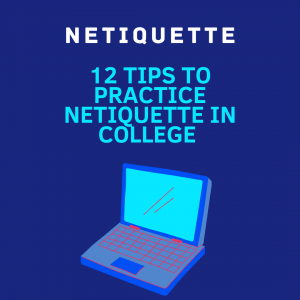12 Tips to Practice Netiquette in College
What is netiquette?
According to the BBC, “the word netiquette is a combination of ’net’ (from internet) and ’etiquette’. It means respecting other users’ views and displaying common courtesy when posting your views to online discussion groups.”
Various sources discuss typical rules for netiquette, and although a lot of this is common sense, it is a good idea to review these rules since many courses and degree programs are offered online.
Here are 12 few rules that you can help you follow best-practice netiquette:
- Keep Your Accounts Secure. Don’t share your passwords with anyone else. Always log out when you are finished with your session.
- Practice the Golden Rule. Treat your instructor and classmates with respect in email or any other communication. Address your professor by his/her proper title. If you are unsure of what it is, use Mr. or Ms. On the other side of that computer screen is a real person with thoughts and feelings just like you.
- Use Good Grammar. Remember that all college level communication should have correct spelling and grammar (this includes discussion boards). Avoid slang terms such as “wassup?” and texting abbreviations such as “u” instead of “you.” Use clear and concise language. Avoid emojis, including ?.
- Be Accurate. Just as with taking an exam or turning in an assignment, fact-checking is equally important when posting online. Include sources if you copy and paste information.Avoid the Temptation to
- Overshare. Avoid posting personal information — like off-topic information about your day — or questions about your course performance that would be better suited to a direct email to your instructor.Don’t Type in
- ALL CAPS. In online communication, ALL CAPS is considered yelling.
- Be Cautious with Sarcasm. Be careful with using humor or sarcasm as tone is sometimes lost in an email or discussion post and your message might be taken seriously or sound offensive.
- Reply All in an Email? Make sure you really want to send your email to all recipients. For more on email netiquette, go HERE.
- Discussion Boards Netiquette. All of these rules apply to discussion boards as well. Use clear and concise language, avoid swearing, stay on topic and take your posts seriously. For more on discussion boards netiquette, go HERE.
- Promote Healthy Discussions. Ask questions, share your experiences and provide positive feedback. “Being a positive contributor is better than being a critic, troll or other negative force.” https://onlinestudyaustralia.com/netiquette-rules-guidelines-students/
- Pause Before you Post. Remember that what you say online is permanent.
- Write Like you Speak. Although you want your emails and discussion posts to be concise, factual and grammatically correct, you also want to find your natural voice and be authentic.
Following these simple rules will make your online learning experience that much better. Remember that real life etiquette translates to online netiquette. For more information about online learning, click HERE.



